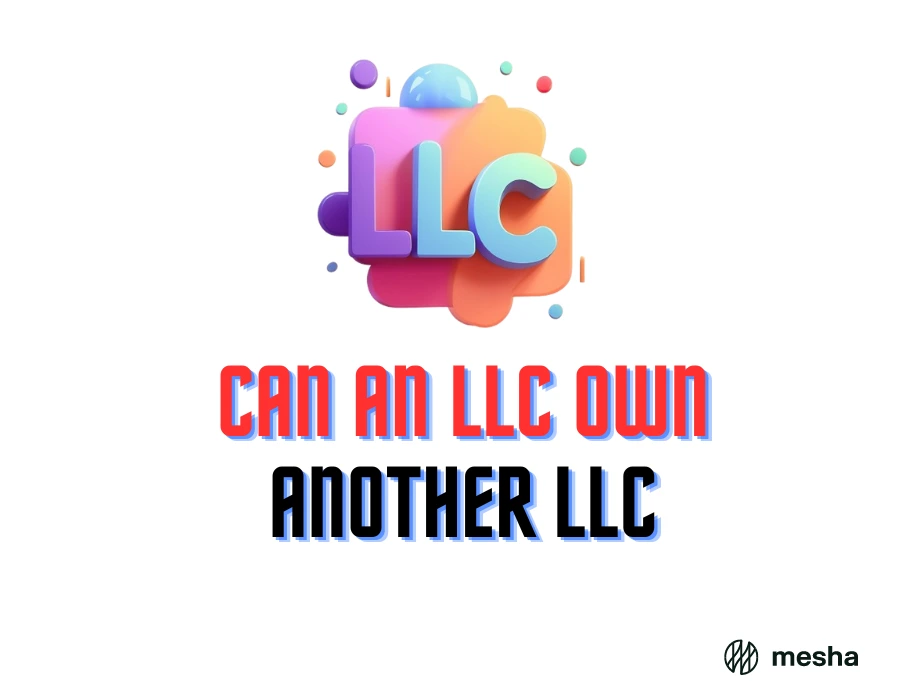Can an LLC own another LLC

One question that often arises is: Can an LLC own another LLC?
The answer is yes, but understanding the intricacies of this LLC ownership structure is crucial.
In this article, we delve into the legal structure of LLCs owning other LLCs. We’ll explore the benefits, the potential risks, and the compliance requirements.
Whether you’re a seasoned entrepreneur or just starting out, this guide will provide valuable insights.
Let’s demystify the complexities of LLC ownership structures together.
Table of Contents
What is an LLC?
An LLC, or Limited Liability Company, is a popular business structure. It combines the flexibility of a partnership with the liability protection of a corporation.
In an LLC, owners are referred to as members. These members can be individuals, other LLCs, or even corporations.
One of the key advantages of an LLC is its flexibility in management. It can be managed by its members (member-managed) or by appointed managers (manager-managed).
Another significant benefit is the limited liability protection. This means that members are not personally liable for the company’s debts or liabilities.
Understanding the basics of an LLC is the first step towards grasping the concept of an LLC owning another LLC.

The Legality of LLCs Owning Other LLCs
Is it legal for an LLC to own another LLC? The short answer is yes.
In the United States, it is perfectly legal for an LLC to own another LLC. This creates a parent-subsidiary relationship between the two entities.
The parent LLC, also known as the holding company, owns the subsidiary LLC. The subsidiary operates as a separate legal entity, even though it’s owned by the parent LLC.
This structure is not only legal but also quite common. It’s used for various strategic business purposes, such as asset protection and business expansion.
Here are some key points to remember about the legality of LLCs owning other LLCs:
- The parent and subsidiary LLCs must comply with state-specific regulations.
- Both LLCs should maintain separate records and finances.
- The operating agreement of the parent LLC should outline the ownership of the subsidiary.
- The subsidiary LLC can enter into contracts, sue or be sued, and own property in its own name.
- Compliance with annual reporting, fees, and other state requirements is essential for both LLCs.
Benefits of an LLC Owning Another LLC
There are several benefits to having an LLC own another LLC. One of the main advantages is asset protection.
When an LLC owns another LLC, the parent company’s assets are protected from the liabilities of the subsidiary. This is because the subsidiary operates as a separate legal entity.
Another benefit is business expansion. A parent LLC can own multiple subsidiary LLCs, each focusing on different aspects of the business. This allows for diversification and growth without changing the parent company’s structure.
Tax implications can also be a benefit. Depending on the chosen tax classification, the parent and subsidiary LLCs can enjoy certain tax advantages.
However, it’s important to note that these benefits come with their own set of complexities. It’s crucial to consult with legal and tax professionals when setting up an LLC that will own another LLC.
How Does an LLC Own Another LLC?
An LLC can own another LLC through a parent-subsidiary structure. The parent LLC, also known as the holding company, owns the subsidiary LLC.
The subsidiary operates as a separate legal entity. This means it can enter into contracts, sue or be sued, and own property in its own name.
The operating agreement of the parent LLC should outline the ownership of the subsidiary. This document defines the relationship between the two entities.
Each LLC must have its own Employer Identification Number (EIN) for tax purposes. They must also comply with state-specific regulations and maintain separate records and finances.
The parent LLC’s control over the subsidiary can vary. It can range from full control to a more hands-off approach, depending on the business goals and needs.
Parent and Subsidiary LLCs
In a parent-subsidiary structure, the parent LLC owns 100% of the subsidiary LLC. This structure is often used for strategic business purposes, such as asset protection and business expansion.
The subsidiary LLC operates independently of the parent LLC. It has its own assets, liabilities, and business operations.
Also Read: LLC tax filing deadline
The parent LLC can exert control over the subsidiary. However, the level of control can vary based on the operating agreement.
The parent and subsidiary LLCs must maintain separate financial records. This is crucial for maintaining the corporate veil and avoiding personal liability.
Single-Member LLC as Owner
A single-member LLC can own another LLC. This can be a sole proprietorship or another single-member LLC.
The single-member LLC, as the sole owner, has full control over the subsidiary LLC. This includes decision-making and management of the subsidiary.
The single-member LLC can benefit from the liability protection offered by the subsidiary LLC. The debts and obligations of the subsidiary do not affect the parent LLC.
However, the single-member LLC must ensure compliance with state regulations and maintain separate records for each LLC.
Multi-Member LLC as Owner
A multi-member LLC can also own another LLC. The members of the multi-member LLC can include individuals, corporations, or other LLCs.
In a multi-member LLC, the members share control over the subsidiary LLC. The level of control depends on the operating agreement.
The multi-member LLC can benefit from the liability protection and tax advantages of owning a subsidiary LLC.
However, managing a multi-member LLC can be more complex. It requires clear communication and agreement among the members.
Tax Implications for LLCs Owning Other LLCs
The tax implications of an LLC owning another LLC can vary. It depends on the chosen tax classification of the LLCs.
By default, the IRS treats single-member LLCs as disregarded entities. This means the LLC’s income and expenses are reported on the owner’s personal tax return.
For multi-member LLCs, the IRS treats them as partnerships. The LLC itself does not pay taxes. Instead, the profits and losses pass through to the members, who report them on their personal tax returns.
However, an LLC can choose to be taxed as a corporation. In this case, the LLC pays corporate taxes, and the members pay personal taxes on any dividends they receive. This is known as double taxation.
Also Read: Setting Up an LLC for OnlyFans
Maintaining Separate Entities and Compliance
When an LLC owns another LLC, it’s crucial to maintain the separateness of each entity. This is important for preserving the limited liability protection that LLCs offer.
Each LLC should have its own Employer Identification Number (EIN) for tax purposes. They should also maintain separate financial records and bank accounts.
Compliance with state-specific regulations is also essential. This includes filing annual reports, paying fees, and meeting other state requirements.
Here are some key points to remember for maintaining separate entities and compliance:
- Each LLC should have its own EIN.
- Maintain separate financial records and bank accounts for each LLC.
- Comply with state-specific regulations, including annual reporting and fees.
- The operating agreement of each LLC should clearly define its relationship with the other LLCs.
Risks and Considerations
While an LLC owning another LLC can offer benefits, it also comes with risks and considerations. One of the main challenges is the complexity of managing multiple entities. This can increase administrative burdens and require more time and resources.
Another risk is the potential for conflicts of interest. These can arise when the interests of the parent LLC and the subsidiary LLC diverge. It’s important to have clear guidelines in place to manage such situations.
The dissolution of one LLC can also impact the other entities in the structure. This can lead to legal and financial complications. Therefore, it’s crucial to have a well-drafted operating agreement that addresses such scenarios.
Lastly, changes in membership can affect the LLC ownership structure and operations. This underscores the importance of having a clear succession plan in place.
Consulting Professionals for LLC Ownership Structures
Given the complexities of LLC ownership structures, it’s advisable to consult with professionals. Legal and tax experts can provide valuable insights and guidance. They can help navigate the intricacies of state laws, tax implications, and compliance requirements.
Additionally, professionals can assist in drafting a comprehensive operating agreement. This document is crucial in defining the relationship between the parent and subsidiary LLCs. It also outlines the rights, responsibilities, and profit distribution among members.
Conclusion
In conclusion, while an LLC can own another LLC, it’s a decision that should be made with careful consideration and professional advice.
Understanding the LLC ownership structure is crucial for business owners. It allows for strategic planning, asset protection, and business expansion. However, it’s essential to consider the legal, tax, and compliance implications. Always seek professional advice to navigate the complexities of owning multiple LLCs.


